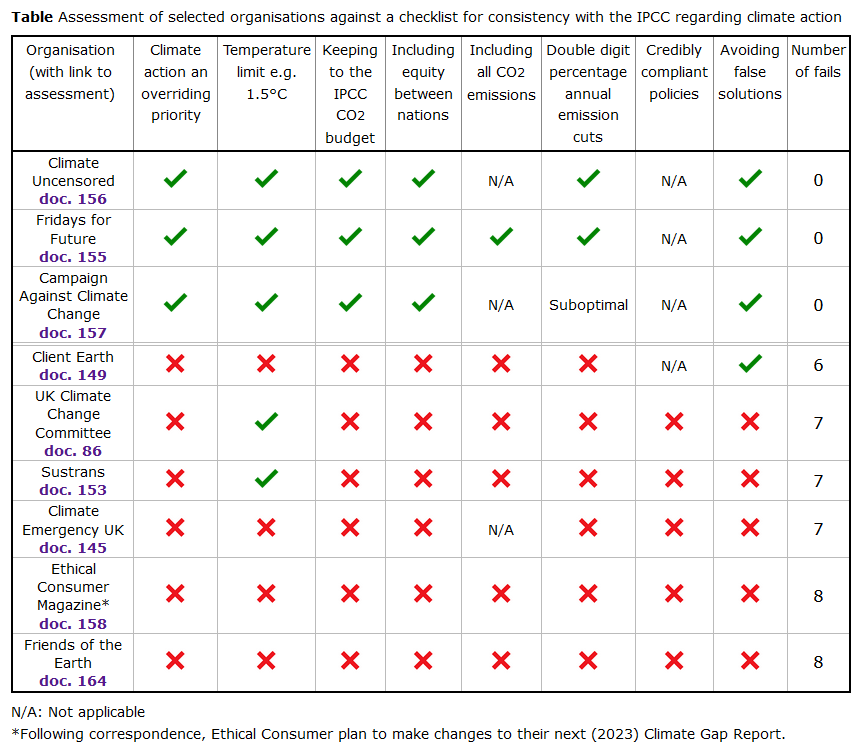
Campaign against Climate Change: Consistent with the IPCC
The Campaign against Climate Change is a UK organisation that campaigns for urgent and radical action against climate change.
Its messaging is assessed here by a checklist for consistency with the IPCC regarding climate action.
The findings are that its messaging is generally in line with the climate science and what the IPCC says needs to be done.
Its messaging could be strengthend by translating its wording of "urgent and radical action" in terms of annual percentage cuts in emissions, and by reference to the Tyndall Climate Centre reports.
Its messaging is assessed here by a checklist for consistency with the IPCC regarding climate action.
The findings are that its messaging is generally in line with the climate science and what the IPCC says needs to be done.
Its messaging could be strengthend by translating its wording of "urgent and radical action" in terms of annual percentage cuts in emissions, and by reference to the Tyndall Climate Centre reports.
Summary table Assessment against a checklist for consistency with the IPCC regarding climate action
| Climate action an overriding priority | Temperature limit e.g. 1.5°C | Keeping to the IPCC CO2 budget | Including equity between nations | Including all CO2 emissions | Double digit percentage annual emission cuts | Credibly compliant policies | Avoiding false solutions | Number of fails | |
|---|---|---|---|---|---|---|---|---|---|
| Campaign Against Climate Change |  |  |  |  | N/A | Suboptimal | N/A |  | 0 |

This can be compared with the assessments for other groups via the summary table in document 154.
The organisation
According to its Mission Statement [1], "the Campaign against Climate Change (https://www.campaigncc.org) exists to push for the urgent and radical action we need to prevent the catastrophic destabilisation of global climate."It is a small organisation with one part-time paid employee.
Messaging assessed
 Because of the amount of inconsistent and contradictory messaging from various groups, two of the organisation's web pages were assessed for adherence to the scientific consensus on climate change and what the IPCC says needs to be done. This was part of a project assessing and comparing a number of groups.
Because of the amount of inconsistent and contradictory messaging from various groups, two of the organisation's web pages were assessed for adherence to the scientific consensus on climate change and what the IPCC says needs to be done. This was part of a project assessing and comparing a number of groups. The web pages assessed were the Mission Statement [1] together with the Climate Justice page [2]. These seem to define the stance of the organisation.
Assessment was carried out using a checklist for consistency with the IPCC - see document 138. There are concerns that there is widespread denial of the implications of the facts of climate change, which is termed implicatory denial [3].
Assessment
A summary of the assessment is given at the top of this page. Details of the checklist elements are given here.1. Is climate action an overriding priority, on the basis of e.g. the gross injustice?
YES - there is a whole web page on the subject [2].
2. Is a limit to global warming specified, generally 1.5°C?
YES - keeping to 1.5°C is discussed [2].
3. Is there adherence to the IPCC CO2 budget? Is the mechanism for limiting global warming clearly stated to be limiting further total global CO2 emissions to the CO2 budget specified by the IPCC?
YES - there is discussion of the remaining carbon budget [2].
4. Is equity between nations incorporated? Are the implications of the international commitments to global equity properly taken into account, i.e. that developed nations cut emissions faster than the global average?
Yes - global equity is discussed in detail including equal per-capita shares and the inclusion of historical emissions [2].
5. Are all CO2 emissions included, particularly those embodied in imports and exports and those from aviation and shipping?
Not applicable - no detailed national CO2 emission figures are discussed.
6. Is the size of appropriate annual emission cuts specified e.g. double digit percentage cuts in developed countries?
Suboptimal - there is a statement on "urgent and radical action" [1], but without detailing what this means.
7. Are any policies discussed consistent with this timescale?
Not applicable - no detailed policies are discussed.
8. Are false solutions avoided?
Yes - there is discussion of the need to avoid unproven technologies.
Comment
In summary, the messaging of the Campaign against Climate Change is largely in line with the climate science and what the IPCC says needs to be done.It could strengthen its messaging about "urgent and radical action" by giving indicative percentage figures for annual emission cuts, e.g. by quoting figures from the Tyndall Climate Centre reports for UK local authorities which showed that annual emissions cuts of typically 13% were needed in 2019 for a 1.5°C target [4], with faster cuts now being needed because of the lack of action - see document 33.
References
| [1] | Campaign against Climate Change: Mission Statement https://www.campaigncc.org/aboutus/missionstatement (accessed 18 Feb 2023). |
| [2] | Campaign against Climate Change: Climate Justice https://www.campaigncc.org/climate_justice (accessed 18 Feb 2023). |
| [3] | Iain Walker and Zoe Leviston (2019) There are three types of climate change denier - and most of us are at least one The Conversation https://theconversation.com/there-are-three-types-of-climate-change-denier-and-most-of-us-are-at-least-one-124574 |
| [4] | Tyndall Centre The Tyndall carbon budget tool (2019) https://carbonbudget.manchester.ac.uk/reports/ |
First published: 18 Feb 2023
Last updated: 16 Aug 2023

 ✖
✖